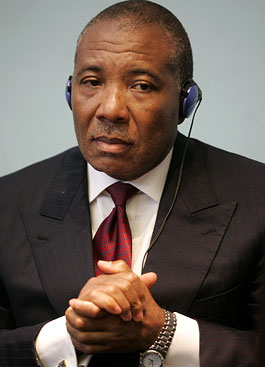Former Liberian president Charles Taylor took the stand Tuesday to testify before an international court at The Hague, which is probing his alleged war crimes. Taylor is charged with multiple heinous crimes, including sending invasions into Sierra Leone “to terrorize the civilian population” and wrest control of the West African country’s diamond mines, and ordering the rape and murder of girls and women and the forced conscription of boys and men.
The criminal trial, which began in 2006, has heard the testimony of more than 90 witnesses of Taylor’s crimes, and the defense plans to call more than 200 witnesses to argue Taylor’s innocence. Though Taylor admitted that he knew such atrocities were occurring, he said that he “never, never, ever” would have condoned them. He also rejected the means by which he was arrested and tried. “The prosecution, because of disinformation, misinformation, lies, rumours, would associate me with such titles or descriptions,” he said.
If the court finds Taylor guilty, West Africa will take a giant step toward repairing the blemish of ethnic violence and injustice that has plagued the region since Western countries began jockeying for control hundreds of years ago.
Read more on Taylor’s troubling history below the jump.
After spending much of his young life in the United States, Taylor returned to West Africa in 1989. (He was jailed in Massachusetts in 1984 for stealing $900,000 from the Liberian government and escaped a year later). Soon after, Taylor launched a coup against Liberian president Samuel Kanyon Doe from the neighboring Ivory Coast. According to the UN indictment, part of Taylor’s winning strategy was to convince children to fight for his coup. Some, fortified by drugs and an immature sense of morality confused by Taylor’s military officials, were trained to commit unspeakable acts. After a long civil war, Taylor was elected President of Liberia in 1997.
But his atrocities did not stop there. Instead of reforming the corruption he despised from Doe’s regime, Taylor became the epitome of Big Man politics, economic corruption, and reckless foreign affairs. Taylor is charged with fomenting civil war in Sierra Leone in order to gain control of its diamond mines, all while he was President. He stepped down in 2003 amidst international criticism and protests of domestic civilian groups. The indictment charges Taylor with providing Sierra Leone’s Revolutionary United Front (RUF) with “financial support, military training, personnel, arms, ammunition and other support and encouragement.”
When asked at The Hague Tuesday if Taylor received diamonds in a mayonnaise jar in return for weapons sold to the RUF, he responded, “Never, ever did I receive—whether it is mayonnaise or coffee or whatever jar—any diamonds from the RUF.”
Despite the overwhelming evidence that has mounted against Taylor, Liberians seek fair justice above all else. Some were wary of reports that Taylor was refused a chance to speak to his lawyer before being questioned. J Lincoln Momo told the BBC, “there is no law that prevents a client from meeting his lawyer during trials like this.”











